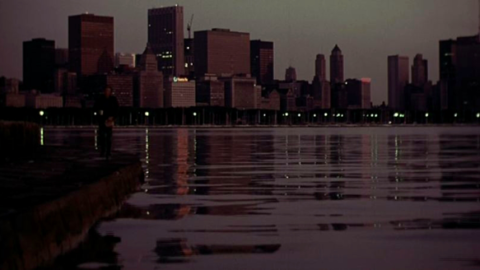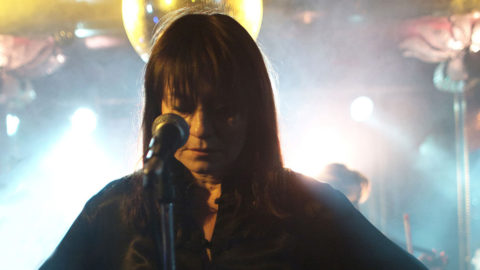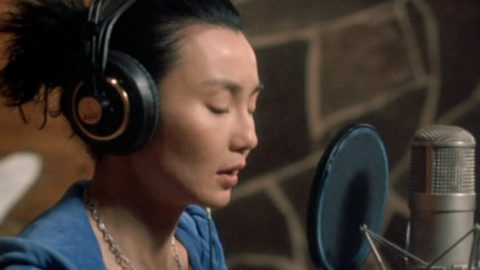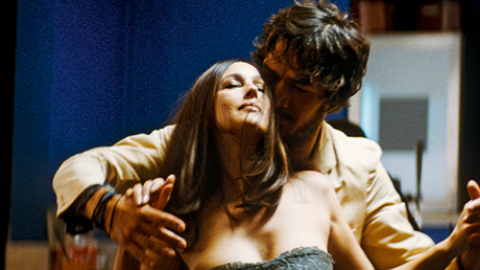Film of the Week: Nico, 1988
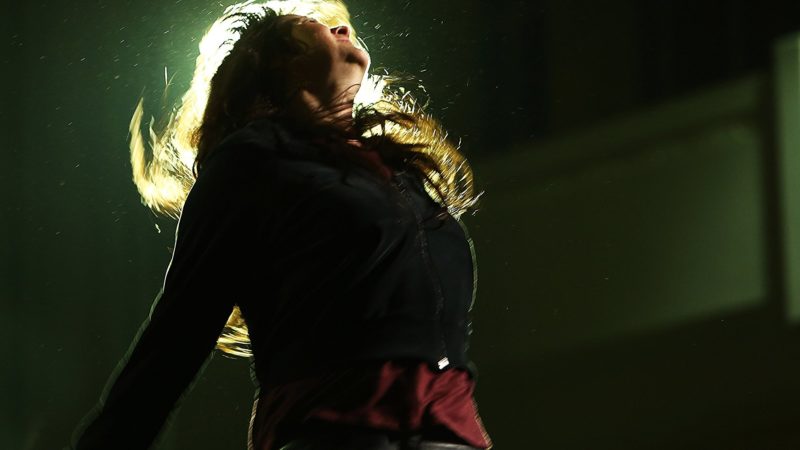
Susanna Nicchiarelli’s Nico, 1988 isn’t what you’d normally call a rock biopic. It doesn’t cover a whole biography, but a short spell at the very end of its subject’s life—a period that, after a career of transcendent glory and glamour, could theoretically be called bathetic. What’s more, that subject, the German singer known as Nico—née Christa Päffgen—never had much to do with rock music in the familiar, mundane sense. She may have appeared on one of the great landmarks in music history—the 1967 LP The Velvet Underground & Nico—but her own contributions to that record were less to do with rock than with a delicate, urbane balladry, a sort of balefully insistent folk lamentation.
Even so, there’s a moment in Nico, 1988 at which Päffgen improbably—and rather gloriously—has a moment of apotheosis as a raucous shouter in a full-tilt garage rock mode. It takes place at an underground concert in Prague in 1987, and the singer—standing at the microphone in front of her band, rather than seated as usual behind her harmonium—gives an angry, passionate, stomping rendition of her song “My Heart Is Empty.” “Angry,” “passionate,” and—God forbid—“stomping” are not words you’d normally associate with the distant, lofty woman who more than any embodied the Ice Queen archetype among singers. Yet, as played by Danish actress Trine Dyrholm, you suddenly believe in Nico emitting this raucous cri de coeur, reinvented as she is here in the wake of Patti Smith, Siouxsie, P.J. Harvey, et al…
Whether or not Nico ever actually performed live like this, the film—and Dyrholm’s terrific, surprisingly warm performance—persuade you that she might have released her wilder side in this way. What’s enjoyable, and very human, about Nicchiarelli’s film is that it also reveals the singer’s dry humor, and the weary but wry vulnerability behind the formidable noli me tangere force field that was her public persona.
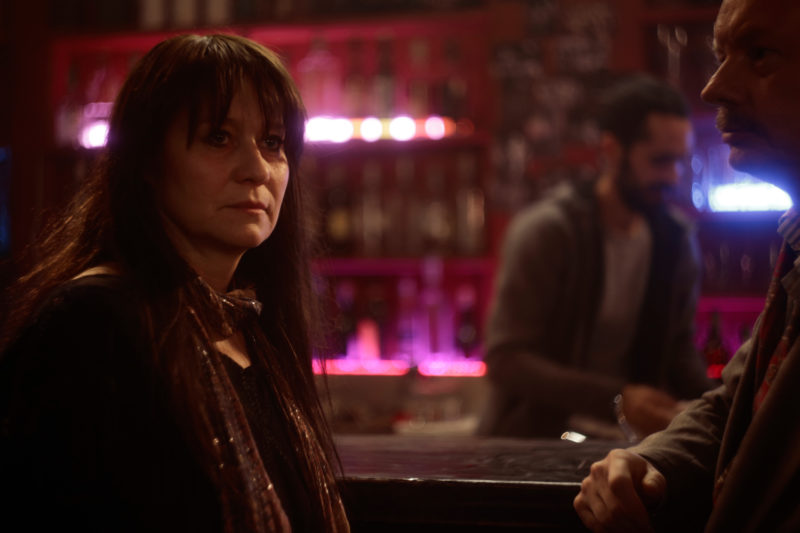
It seems ominous at first that the film’s credits play out over speeded-up images of New York in the days when Nico was a star of the Andy Warhol circus; throughout the film, Nicchiarelli uses original Jonas Mekas footage to give us brief flashbacks to her heroine’s gilded past. But Nicchiarelli’s point is that all this was the past, and a past that Päffgen had long since wearied of: she was tired of telling stories about it, tired even of her name. At the start of the film, she looks pained when—not for the first or even the thousandth time, you can bet—a gauche English radio DJ announces her as “Lou Reed’s ‘Femme Fatale.’” And throughout the film, by her insistence, she’s not Nico but Christa.
When the story begins, in 1986, Päffgen has cut links with the past and the legend—as far as people will allow her to. She’s haunted by her three songs with the Velvet Underground, yet hardly anyone talks about her own formidable and daunting oeuvre. Nico’s solo music was, and remains, challenging, mapping an exotically glacial inner landscape: in its unadorned form, from 1968’s The Marble Index onward, hypnotically droning harmonium underneath a sepulchral contralto chant. It’s music that Laura (Karina Fernandez), partner to Nico’s Mancunian manager, calls “hideous”—but heard with open ears, it’s compellingly, forbiddingly beautiful, and entirely unique.
When the film starts, Nico—once the toast of New York, Paris, Rome, and elsewhere—has improbably moved to Manchester, then still enjoying its punk/post-punk renaissance. She likes the place because, she states matter-of-factly, it reminds her of her home city Berlin, “when it was in ruins after the war.” She moves into a rented house in an altogether unglamorous Manchester street, and she has a local manager, an unflappable, resourceful yeoman of a chap, Richard (John Gordon Sinclair, in a variety of ill-fitting mid-80s suits). She also has a backing group, which she dismisses sourly as “a band of amateur junkies,” although as they’re heard here, they’re terrific. Nico’s live and recorded sound has been reimagined for the film by an Italian group named Gatto Ciliega contro il Grande Freddo, which means “Cherry Cat versus The Great Cold”—not a name you can imagine Nico finding cute or clever, but they provide inventive rearrangements of her repertoire, including the heart-breaking Jackson Browne song “These Days,” played over the opening credits.

Apart from the Prague episode, the film sees Nico playing a sparsely attended open-air concert in Italy, breaking off to rage at her hapless bass player. She’s subsequently persuaded to play an impromptu hotel gig with a local jazz band: you expect calamity but she’s magnificent, singing “Nature Boy” to lounge piano backing, her long slurred vowels opening up new spaces in a well-worn standard (as Nico did on an affecting 1985 appropriation of “My Funny Valentine”).
The film is largely about the singer’s eventual attaining of some sort of reconciliation with the past and even hopes for the future. But it’s a future that never came: the film is bookended by brief shots of a sunny retreat in Ibiza; at the start Christa says goodbye to her son with a painfully ironic exit line, “I’m going out—I’m taking the bike.” She had a heart attack on that cycle ride, on July 18, 1988, subsequently dying of a brain hemorrhage.
If there was hope in Päffgen’s life at the end, it didn’t so much come from new appreciation of her work: despite a final album, Camera Obscura, recorded with local musicians The Faction, her status on the music scene had become even more marginal than in the past. Rather, the film suggests, her renewal came partly from a briefly sketched relationship with an Italian musician (Thomas Trabacchi), and more substantially, from the dedication of her long-suffering, altogether grounded manager, Richard. He’s a fictional character in the film, but presumably based to a large degree on Nico’s manager at this time, the late Alan Wise, one of several people credited at the end for contributions to Nicchiarelli’s research. It’s a bewildered Richard who helps Nico check into her new house, organizes the band’s touring, provides heroin and methadone when needed, and generally troubleshoots, as when the artist is confrontationally facing down her adoring but gauche Czech promoters.
Her relationship with Richard is the emotional backbone to the film, thanks not least to Sinclair’s gentle, nuanced, often wonderfully performance. Things get particularly touching towards the end when she starts properly smiling for the first time; she confides in him that she plans to become “an elegant old woman, not a fat old junkie,” before admitting, “methadone makes me sentimental.” But their relationship and the way it’s presented, notably in the tour sections, sometimes makes Nico, 1988 feel less specifically about its subject, and more generally about the nightmare of dealing with wayward, ego-ridden performers, brilliant or otherwise, in the rock world or elsewhere: its comedy, in the goofier moments, reminded me a little of Lenny Abrahamson’s Frank, the apprenticeship tale of a young musician’s travails in the band of an eccentric quasi-genius. There are strands here that feel superfluous. Anamaria Marinca is completely wasted (and not in the rock ’n’ roll way) as a straitlaced violinist who has a passionate but doomed romance with the band’s bass player (Calvin Demba): they’re charming people, but one just couldn’t care less. As for Fernandez, show-stoppingly good in recent Mike Leigh films, her Laura doesn’t have a great deal to do except look patiently disapproving of the whole bohemian oddity of it all.

The other figure in Nico’s story, who doesn’t really emerge in much light and shade, is her son Ari, né Christian, played here as a battered Adonis by Sandor Funtek. There are references to Ari looking exactly like his father—who’s never named, although he’s commonly believed to be the son of Alain Delon, who never acknowledged him. Ari’s ever-smiling presence towards the end of his mother’s life clearly helps her turn some corner, and it’s nicely evoked in a scene where mother, son, and the band visit a bleak Eastern European monument that for a moment, as shot by Crystel Fournier, looks like heaven on earth.
Nico’s glory and decline have been amply evoked in the past—notably in Susanne Ofteringer’s 1995 documentary Nico Icon and in the book Songs They Never Play on the Radio, a memoir of her Manchester years by musician James Young. What this film offers that’s new is a warm, sometimes humorous, and convincingly demystifying depiction of the singer, superbly incarnated by Dyrholm. The characterization could easily have turned to caricature, but Dyrholm avoids, among other things, a too-literal vocal impersonation—the sort that would have made Nico sound like Werner Herzog’s blasé big sister.
Dyrholm sometimes affects a world-weary rasp loaded with a weight of contemptuous sophistication, but in her general manner she embodies the cantankerousness and amusement of a middle-aged woman who has always lived, ruinously or gloriously, by her own agenda. The actress gives Nico a vulnerability and a delicate sense of exhaustion that make sense in someone who frequently needs isolation—whether it’s to inject herself in the ankle, or to wander off and record the sound of a water heater—and who looks absurdly out of place hemmed in among other people on a cramped tour bus. Eschewing any kind of glamour, Dyrholm rather makes her Päffgen look wearier and more matronly than Nico actually did at this period, to make her last-minute revitalization seem more vivid: there’s a moment at the end, in those discussions with Richard, when she suddenly blossoms with a subtle radiance.
This can be a messy film: there’s a dreadful false note in the goofy characterization of the Jewish landlord who’s comically taken with the singer, and Nicchiarelli flails awkwardly when trying to integrate the question of Päffgen’s reported anti-Semitism. The meaning of Berlin as myth and primal scene in her life is clumsily approached in a decidedly kitsch opening scene and a childhood interlude that suggests a Disney remake of Germany Year Zero. But overall, this kind of compassionate dismantling of Nico the myth is done with insight, tenderness, and clear-eyed realism. Flaws notwithstanding, Nico, 1988 is—if I can be forgiven for finally slipping a Lou Reed song title into this review—what becomes a legend most.
Jonathan Romney is a contributing editor to Film Comment and writes its Film of the Week column. He is a member of the London Film Critics Circle.



